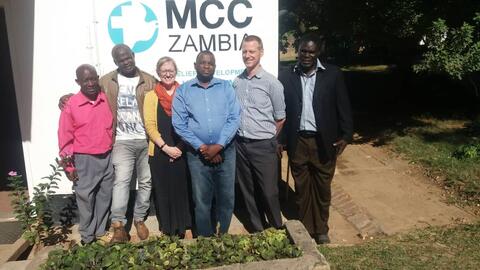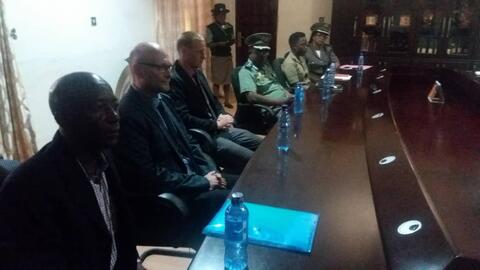Restorative Justice: A Path to Peace
Conflict usually brings pain and disorder, and often leads to further conflict but Restorative Justice paves a different path – a path that can lead to peace. Issa Ebombolo earned his Master of Peace and Conflict Studies (MPACS) degree from Conrad Grebel University College in 2017. Currently, Issa works for Mennonite Central Committee (MCC) Zambia and Malawi as a Peacebuilding Coordinator providing peace resourcing to local partners, including the government of Zambia.
 In 2006, Issa founded Peace Club—a club that aims to empower people with cultures of peace. Thirteen years later, in 2019, Issa used his learnings from building civil society and insights from MPACS to create a Restorative Justice and Peacebuilding (RJPB) unit within the correction department of the Zambia Correctional Service (ZCS). “The goal is to restore relationships through victim-offender reconciliation processes and to facilitate the reintegration of former inmates into communities,” Issa explained.
In 2006, Issa founded Peace Club—a club that aims to empower people with cultures of peace. Thirteen years later, in 2019, Issa used his learnings from building civil society and insights from MPACS to create a Restorative Justice and Peacebuilding (RJPB) unit within the correction department of the Zambia Correctional Service (ZCS). “The goal is to restore relationships through victim-offender reconciliation processes and to facilitate the reintegration of former inmates into communities,” Issa explained.
In Zambia, there are 65 correctional facilities with a combined total of 21,000 inmates. These facilities suffer from overcrowding, a lack of resources, and frequent conflicts and violence. The majority of inmates are perceived as criminals, a danger to society, and often rejected by their families and communities upon reintegration, which can result in cycles of harm. As an attempt to correct these issues and meet the Universal Human Rights Standard, the Zambian government shifted from prison/punishment to a correctional approach in January 2016. Unfortunately, this venture did not translate into practical change. “Only the terminologies changed from prison to correctional facilities,” Issa said. “The attitudes and behaviours of the inmates, prison officers, and the prison system remained unchanged.”
 Issa sought to correct this situation by becoming the link between MCC and the Zambian government to analyze and reflect on the prison system, develop strategies, and to design and implement restorative approaches into the correctional facilities. “I used some concepts and theories that I learned from MPACS courses such as conflict analysis with Nathan Funk, reflective practice of peace with Reina Neufeldt, and peacebuilding and civil society with Lowell Ewert to respond to my tasks,” Issa said. In order to create an effective project, Issa broke his tasks into four dimensions and using tools that he learned in the MPACS conflict analysis course, he carefully analyzed the Zambia prison context. He came up with key assumptions and with them, Issa ensured that MCC’s “intervention did not contribute to the escalation of the existing conflict in prisons and communities, and cause more harm than good.”
Issa sought to correct this situation by becoming the link between MCC and the Zambian government to analyze and reflect on the prison system, develop strategies, and to design and implement restorative approaches into the correctional facilities. “I used some concepts and theories that I learned from MPACS courses such as conflict analysis with Nathan Funk, reflective practice of peace with Reina Neufeldt, and peacebuilding and civil society with Lowell Ewert to respond to my tasks,” Issa said. In order to create an effective project, Issa broke his tasks into four dimensions and using tools that he learned in the MPACS conflict analysis course, he carefully analyzed the Zambia prison context. He came up with key assumptions and with them, Issa ensured that MCC’s “intervention did not contribute to the escalation of the existing conflict in prisons and communities, and cause more harm than good.”
After eighteen months of working with the Zambia Correctional Service on the project, in collaboration with Rod Friesen, Issa and MCC achieved much success. “So far, 102 correctional officers have received training in Restorative Justice and peacebuilding during four separate workshops,” Issa said. In addition, MCC Zambia has established RJPB units in 42 correction facilities, where 46 officers are actively engaged in the victim-offender reconciliation processes.
To extend the benefits of Restorative Justice and peacebuilding skills across Zambia, MCC developed a module consisting of 15 lessons to teach the in-service and newly recruited correctional officers at Zambia’s training college for correctional staff. Issa and Rod used their expertise to train correctional services staff lecturers in restorative justice approaches and MCC helped resource a new library for the college.
 Issa is particularly proud of his work with other Zambian civil society organizations to advocate for a change in the nation’s old Prison Act. “Our advocacy was successful and we worked with the government to draft a new Correctional Act—the ‘Correctional Act of 2021’. The draft is currently being debated in the Zambian Parliament. The old Prison Act is likely to be repelled and changed to the new Correctional Act before the end of May 2021.”
Issa is particularly proud of his work with other Zambian civil society organizations to advocate for a change in the nation’s old Prison Act. “Our advocacy was successful and we worked with the government to draft a new Correctional Act—the ‘Correctional Act of 2021’. The draft is currently being debated in the Zambian Parliament. The old Prison Act is likely to be repelled and changed to the new Correctional Act before the end of May 2021.”
Issa’s work taught him a lot about Restorative Justice. He narrowed down Restorative Justice to two main points: “One, when an individual causes harm, the relationship between the victim and offender breaks. Two, the broken relationship between the victim and the offender has its ripple effects that affect family, friends, neighbors, etc.” And to sum up these two points, Issa said, “To me, Restorative justice is a process where the affected parties agree collectively to deal with the aftermath of the harm and its implications.”